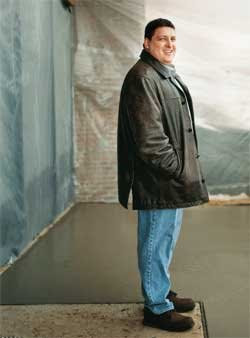Diane Humetewa (Class of 1993), the first Native American to serve as U.S. Attorney for the District of Arizona, was one of a handful of Native students in her law-school class, only half of whom graduated despite tremendous support from the Indian Legal Program.
“It made me realize the importance of helping other Native students succeed,” said Humetewa, who has stayed connected to the program and has served as a mentor.
“These students come from Indian communities, smaller towns, and don’t have the huge university experience,” she said. “Often they wonder, ‘How will this education matter to the community I’m going to go back to?’ “The program has helped fill in the gaps with mentors, and engaged students in the local community through clinics and summer programs.”
Law school was not something Humetewa had planned on. She worked in the U.S. Attorney’s Office in 1986 as one of the first victim-witness advocates in the federal criminal Justice system and helped develop a victim advocacy model that was replicated nationally. “Several of my colleagues encouraged me to go to law school,” she said.
Both Humetewa’s parents went to Indian boarding schools, her father in Santa Fe and her mother at Phoenix Indian High School. They expected their children to go to college, but were surprised and pleased when Humetewa decided on law school. “They saw the passion I had for working with crime victims, making sure their needs were addressed, and for handling what can be emotionally draining cases, and they appreciated that,” she said.
Judge Stephen M. McNamee of the U.S. District Court of Arizona, told her to choose a local law school. “He said, ‘You’re most familiar with the legal environment in Arizona, your primary focus is to come back and be a prosecutor here in Arizona, and you’ll have more localized opportunities for mentoring and summer work that will matter for your long-term goal,’ ” Humetewa said.
The Indian Legal Program at Arizona State University was welcoming and supportive, said Humetewa, who met Siera Russell, then-director, and Paul Bender, who taught Indian law. “I literally had no knowledge of Indian law as it is known today,” Humetewa said. “But it felt like a nurturing place. The individuals there were just as interested in my success as I was.” Support included study groups and tips on how to survive the first year. “They also assigned us mentors,” Humetewa explained. “One of mine was Diane Enos, who is now president of the Salt River Pima-Maricopa Indian Community, dealing with some of the most sophisticated issues in Arizona.”
And she learned of an internship on Arizona Sen. John McCain’s staff. “Taking that internship, spending a semester in Washington, D.C., helped me put a practical background to the federal Indian law I was learning,” Humetewa said. “It all jelled.”
Humetewa said the Indian Legal Program had a profound impact on her. “The concentration of faculty and their foresight that federal Indian law touched on so many aspects of society, economically and politically, provided me a great opportunity to understand,” Humetewa said. “What made the program so successful was the leadership of the law school and their recognition that there is a unique opportunity to expand the educational horizon that traditional law schools weren’t providing for. “They were able to find, and tap into, Indian experience in water law, gaming law, federal Indian law. What has made the program stand out is that they really paid attention to the quality of the subject matter and the quality of the individuals they brought in to explain that subject matter. “I’m grateful to be a very small part of it.”
Humetewa served as counsel in the U.S. Department of Justice office of Tribal Justice, and as counsel for McCain before rejoining the U.S. Attorney’s Office in 1996 as a Special Assistant U.S. Attorney, then Assistant U.S. Attorney. She prosecuted violent crime cases including child sex crimes, homicides, assaults, bank robberies, and theft of cultural patrimony cases. She also worked in the civil section defending lawsuits brought against the United States under the Federal Tort Claims Act, and represented the United States’ interests in Bankruptcy Court.
In 2001, she was promoted to Senior Litigation Counsel/Tribal liaison and was responsible for relationships between the 21 Indian tribal governments and the U.S. Attorney’s Office and for oversight of the Victim/Witness Program. She is considered a national expert in Indian Country issues and has instructed law enforcement and prosecutors in federal criminal procedure, jurisdiction, child abuse, federal victims’ rights, and laws protecting Native American patrimony, artifacts and grave sites.
She said she never thought about becoming a U.S. Attorney. “In my view, I had accomplished what I set out to do, to become a prosecutor who could advocate for victims of crime and enforcement of laws. I was very content.
“Being a prosecutor is the best job in this office, because you deal with so many issues: archaeology, geography, and the variety of populations we have in Arizona that have different and distinct needs. “You’re constantly learning not just about law enforcement in the area, but the application of that law and helping to shape that law, with convictions that are challenged and go up to the Ninth Circuit. It was the best job I ever had because I was constantly growing with each case.”
Humetewa has interns in her office who learn the variety of cases a federal prosecutor can take on. “Some have gone on to be law clerks for tribal nations or trial attorneys in a tribe’s general counsel office,” she said. “In reverse, tribal leaders look to ASU for development and sharing information, like writing tribal codes and legal research.”
Humetewa said there has been a sea change for Native law. “The doors have swung open,” she said. “Universities have developed Indian law programs because of the recognition that tribes are economic players, and tribes are encouraging their young people to get law degrees because they believe that will help them receive fair representation.”



